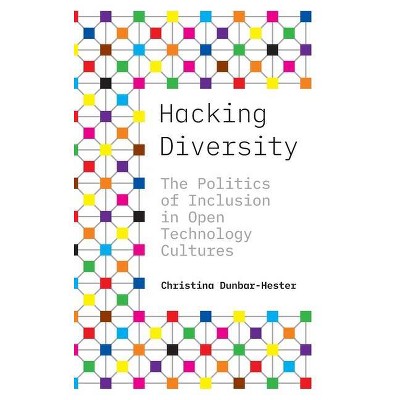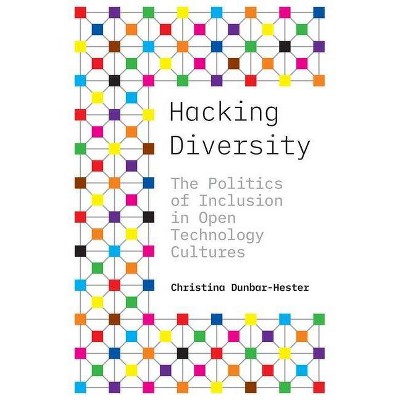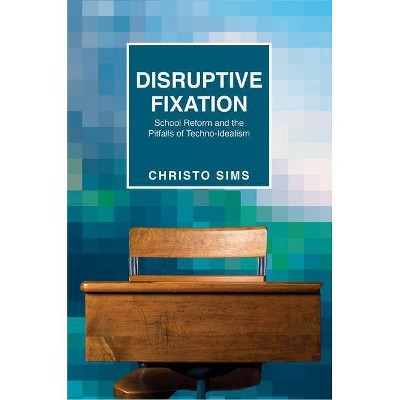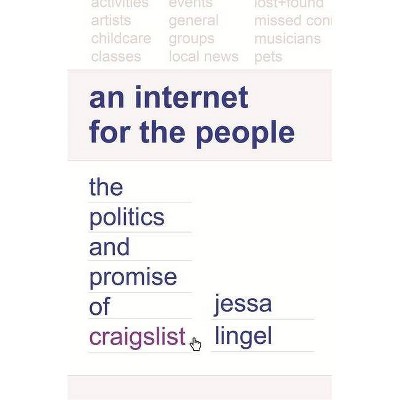Hacking Diversity - (Princeton Studies in Culture and Technology) by Christina Dunbar-Hester (Hardcover)

Similar Products
Products of same category from the store
AllProduct info
<p/><br></br><p><b> About the Book </b></p></br></br>"We regularly read and hear exhortations for women to take up positions in STEM. The call comes from both government and private corporate circles, and it also emanates from enthusiasts for free and open source software (FOSS), i.e. software that anyone is free to use, copy, study, and change in any way. Ironically, rate of participation in FOSS-related work is far lower than in other areas of computing. A 2002 European Union study showed that fewer than 2 percent of software developers in the FOSS world were women. How is it that an intellectual community of activists so open in principle to one and all -a community that prides itself for its enlightened politics and its commitment to social change - should have such a low rate of participation by women? This book is an ethnographic investigation of efforts to improve the diversity in software and hackerspace communities, with particular attention paid to gender diversity advocacy"--<p/><br></br><p><b> Book Synopsis </b></p></br></br><p><b>A firsthand look at efforts to improve diversity in software and hackerspace communities</b> <p/>Hacking, as a mode of technical and cultural production, is commonly celebrated for its extraordinary freedoms of creation and circulation. Yet surprisingly few women participate in it: rates of involvement by technologically skilled women are drastically lower in hacking communities than in industry and academia. <i>Hacking Diversity</i> investigates the activists engaged in free and open-source software to understand why, despite their efforts, they fail to achieve the diversity that their ideals support. <p/>Christina Dunbar-Hester shows that within this well-meaning volunteer world, beyond the sway of human resource departments and equal opportunity legislation, members of underrepresented groups face unique challenges. She brings together more than five years of firsthand research: attending software conferences and training events, working on message boards and listservs, and frequenting North American hackerspaces. She explores who participates in voluntaristic technology cultures, to what ends, and with what consequences. Digging deep into the fundamental assumptions underpinning STEM-oriented societies, Dunbar-Hester demonstrates that while the preferred solutions of tech enthusiasts-their "hacks" of projects and cultures-can ameliorate some of the "bugs" within their own communities, these methods come up short for issues of unequal social and economic power. Distributing "diversity" in technical production is not equal to generating justice. <p/><i>Hacking Diversity</i> reframes questions of diversity advocacy to consider what interventions might appropriately broaden inclusion and participation in the hacking world and beyond.</p><p/><br></br><p><b> Review Quotes </b></p></br></br><br>Winner of the ASIS&T Best Information Science Book Award, Association for Information Science and Technology<br><br>Winner of the ASIS&T Best Information Sciences Book Award, Association for Information Science and Technology<br><br>Dunbar-Hester notes that diverse hacking efforts in open technology communities have made some progress toward creating more inclusive environments. But these efforts remain limited in their approach and conflate technological participation with the social power that is an outgrowth of it. Framing diversity in open technology communities as a problem of representation is convenient and does produce some morally good outcomes.<b>---Jenna P. Carpenter, <i>IEEE Technology and Society Magazine</i></b><br><br>[Dunbar-Hester's] conclusions are refreshingly universal and her insights will be valuable to many people seeking to make their industries more diverse and inclusive.-- "Lady Science"<br><p/><br></br><p><b> About the Author </b></p></br></br><b>Christina Dunbar-Hester</b> is associate professor of communication in the Annenberg School for Communication and Journalism at the University of Southern California. She is the author of <i>Low Power to the People: Pirates, Protest, and Politics in FM Radio Activism</i>.
Price History
Price Archive shows prices from various stores, lets you see history and find the cheapest. There is no actual sale on the website. For all support, inquiry and suggestion messages communication@pricearchive.us




















